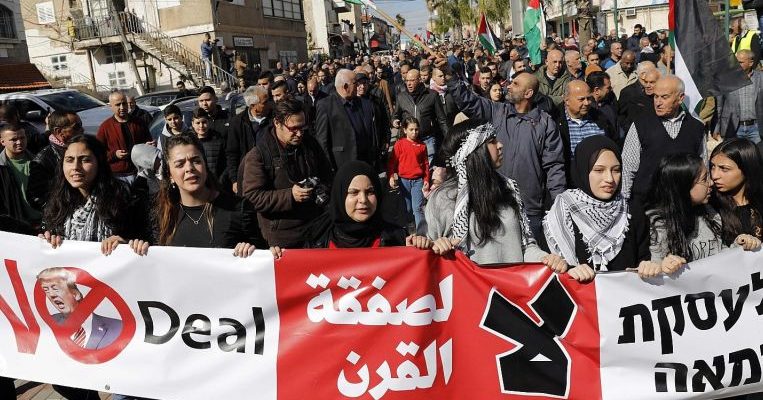
CAIRO • Palestinian leader Mahmoud Abbas yesterday announced a cutting of all ties with Israel and the United States, including security cooperation, days after Washington unveiled a controversial Middle East peace plan.
Mr Abbas spoke at an Arab League meeting in Cairo called after US President Donald Trump presented the plan, which is seen as staunchly favouring Israel but offers Palestinians a pathway to a limited state.
“We are informing you that there will be no relations with you (Israel) and the United States, including on security cooperation,” Mr Abbas said.
He added that the US plan was in “violation of the (autonomy) accords” launched in Oslo in 1993 by Israel and the Palestinians.
The Palestinian leader said the decision follows the US and Israel’s “disavowal of signed agreements and international legitimacy”.
Israel will have to “bear responsibility as an occupying power” for the Palestinian territories, Mr Abbas said, adding that Palestinians will press ahead with their legitimate struggle using peaceful means.
Mr Trump’s “deal of the century” would give the Jewish state a green light to annex chunks of territory in the occupied West Bank, where more than 400,000 Israelis live in settlements deemed illegal under international law.
In Umm al-Fahm, a hilltop town of over 50,000 people in northern Israel, locals are aghast at a clause on page 13 of the 181-page plan, which would barter their Israeli citizenship for the interests of the settlers.
As part of an “exchange” of territory, the Trump deal, entitled Peace To Prosperity, could transfer control of the Arab “triangle” – a cluster of 14 towns and villages where more than 260,000 Israeli Arabs live – from Israel to a mooted Palestinian state.
“The Vision contemplates the possibility, subject to agreement of the parties that the borders of Israel will be redrawn such that the Triangle Communities become part of the State of Palestine,” reads the text published by the White House.
That idea was welcomed by former defence minister Avigdor Lieberman, head of the secular nationalist Yisrael Beitenu party, who proposed such a swop in 2004.
But triangle residents find it a bitter pill to swallow. “We don’t take this lightly. This situation is very serious, and it makes me very afraid,” said Ms Rosine Zaid, sitting in an Umm al-Fahm cafe.
“We’re not going to let that happen,” added her friend Lubna Asali, between sips of coffee.
Said 16-year-old Abdel: “We are ready to defend our land. We are against this programme.”
He supports a Palestinian state, but with its capital in Jerusalem, which the plan acknowledges as Israel’s “undivided” capital.
“If they want to get us out of Israel, we want Jerusalem to follow us,” he said.
The Trump proposal does not in fact advocate the physical relocation of triangle residents. Instead, it would change the status of their communities, making them a Palestinian enclave cut off from the neighbouring West Bank by an Israeli barrier erected during the bloody second Palestinian intifada in the early 2000s.
They fear that as citizens of a Palestinian state, they would lose the benefits of Israel’s thriving economy, its health and welfare system and the freedom to enter Israel, where many of their relatives have lived since before the creation of the Jewish state in 1948.
“We are part of the Arab minority in Israel and we live on our national land,” said Mr Yousef Jabareen, a Member of the Israeli Parliament and an Umm al-Fahm native.
AGENCE FRANCE-PRESSE
